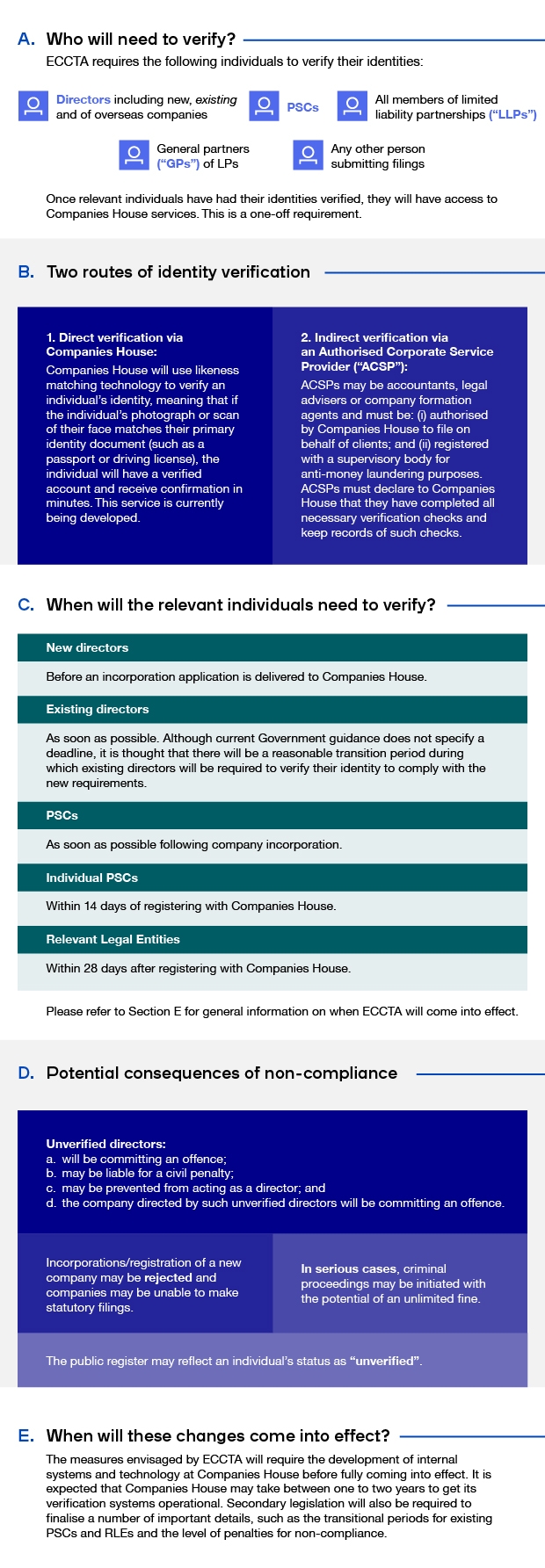Key takeaways
The Economic Crime and Corporate Transparency Act 2023 (“ECCTA”) introduces changes to UK company law to ensure accuracy of public information and reduce the possibility of fraud. Some of the key points are:
- Companies House (the UK Registrar of Companies) will have wider powers and a more active role in processing company information (including the ability to check, remove, change or decline information that is submitted or already on the Companies House register);
- Companies will be subject to new filing and information requirements at Companies House;
- Identity verification will be required for company directors, people with significant control (“PSCs”) and those who file on behalf of companies; and
- Limited partnerships (“LPs”) will be required to disclose more information.
Identity verification

Practical considerations
To improve the accuracy of the company register, the following measures will be introduced:
A. Updates to filing requirements:
- Companies House can require all information to be filed electronically, including accounts in iXBRL format.
- LPs must notify Companies House within 14 days of any changes in information. Failure to make a relevant filing will be an offence and punishable by a fine.
- The threshold for filing false and misleading statements will be lowered from “knowingly or recklessly” to “without reasonable excuse”. Under the new regime, both the company and officers can be held liable.
B. Requires appropriate registered office and email address:
- A company must now have an “appropriate” registered address (public) and “appropriate” email address (private).
- In both cases, “appropriate” means the address can accept delivery, receipt can be acknowledged and correspondence can come to the attention of a relevant company representative. PO boxes are not permitted.
- If the addresses are considered inappropriate, Companies House can change them to their company number.
- Failure to maintain the appropriate addresses will be an offence (committed by the company and its directors) and punishable by a fine.
- Draft regulations have been published but further guidance is expected.
C. Restrictions on the use of corporate directors:
- Further legislation will be passed to introduce restrictions on corporate directors, including requiring them to be natural persons whose identities will need to be verified. These changes will include that a company only be permitted to have one layer of corporate director. Companies with existing corporate directors will have to comply within 12 months of the implementation of the new procedure.
D. Further information for GPs and LPs:
- Companies House will require further information from GPs and LPs. For individuals, this includes their date of birth, nationality and residential address, and for corporate partners this includes their principal office, service address and legal form.
- LPs must also be registered at an “appropriate” registered address (public) and email address (private).
- Corporate GPs must appoint a registered officer who: (i) is an individual; (ii) is a managing officer of the GP; and (iii) has undergone identify verification.
- Existing LPs have six months from the date of the legislation (i.e., until 26 April 2024) to provide the information.
- Failure to provide certain information may lead to Companies House taking steps to dissolve the LP.
E. Updates to a company’s register of members and the requirement for a shareholder list:
- Under ECCTA, a company’s register of members (shareholder register) will need to include each shareholder’s full name and service address. Companies can no longer keep their register of members at Companies House. Instead, all companies will need to keep their own register of members.
- Nominee shareholders must reveal who controls the shares they hold.
- All companies must provide Companies House with a one-off full list of their shareholders in the first confirmation statement following ECCTA coming into force. This applies to all companies except those whose shares are admitted to trading on the LSE’s Main Market or AIM (and are subject to DTR 5).
- Failure to respond to requests for such information will constitute a criminal offence, punishable by fine (the amount of which is to be specified in secondary legislation) or imprisonment (if the person knowingly submits misleading, false or deceptive information).
F. Updates to the company name regime:
- Currently, new company names cannot be too similar to an existing name of a company registered and certain terms are restricted. (Additional requirements are set out below). Further secondary legislation and guidance about this is due to be issued.
- Companies House can, with the guidance and approval of the Secretary of State, reject:
- a company name if it could be used to facilitate crimes of dishonesty or deception or relates to any conduct that is classified as a crime in the United Kingdom;
- a name that suggests a non-existent connection with a foreign government or an international institution; and
- names that comprise or contain a computer code.
- The ECCTA gives the Secretary of State and Companies House the power to direct existing companies to change their names if they fall into the above categories.
- If a company does not change its name within a 28-day period, Companies House can remove a company’s name from the Register and replace it with its company number. If the company continues to trade under the business name that Companies House has changed, they will be guilty of an offence and liable for a fine of up to £1,000.
Other implications
You can read about other key implications arising from ECCTA in an article published by Law360, where Morrison Foerster’s Hayley Ichilcik and Julius Handler discuss the reforms to corporate criminal liability and the introduction of a new “failure to prevent fraud” offence.
Nafeesa Deen, trainee solicitor at Morrison Foerster, contributed to authoring this update.
[View source.]